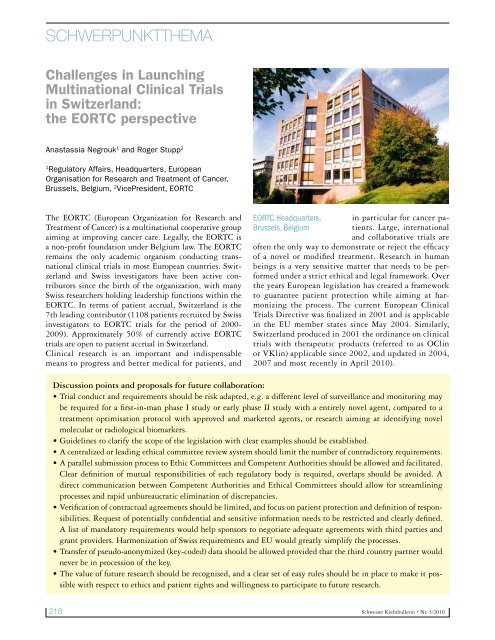Pragmatische Lösung eines komplexen Problems Schweizer ...
Pragmatische Lösung eines komplexen Problems Schweizer ...
Pragmatische Lösung eines komplexen Problems Schweizer ...
Sie wollen auch ein ePaper? Erhöhen Sie die Reichweite Ihrer Titel.
YUMPU macht aus Druck-PDFs automatisch weboptimierte ePaper, die Google liebt.
SCHWERPUNKTTHEMA<br />
Challenges in Launching<br />
Multinational Clinical Trials<br />
in Switzerland:<br />
the EORTC perspective<br />
Anastassia Negrouk 1 and Roger Stupp 2<br />
1<br />
Regulatory Affairs, Headquarters, European<br />
Organisation for Research and Treatment of Cancer,<br />
Brussels, Belgium, 2 VicePresident, EORTC<br />
The EORTC (European Organization for Research and<br />
Treatment of Cancer) is a multinational cooperative group<br />
aiming at improving cancer care. Legally, the EORTC is<br />
a non-profit foundation under Belgium law. The EORTC<br />
remains the only academic organism conducting transnational<br />
clinical trials in most European countries. Switzerland<br />
and Swiss investigators have been active contributors<br />
since the birth of the organization, with many<br />
Swiss researchers holding leadership functions within the<br />
EORTC. In terms of patient accrual, Switzerland is the<br />
7th leading contributor (1108 patients recruited by Swiss<br />
investigators to EORTC trials for the period of 2000-<br />
2009). Approximately 50% of currently active EORTC<br />
trials are open to patient accrual in Switzerland.<br />
Clinical research is an important and indispensable<br />
means to progress and better medical for patients, and<br />
EORTC Headquarters,<br />
Brussels, Belgium<br />
in particular for cancer patients.<br />
Large, international<br />
and collaborative trials are<br />
often the only way to demonstrate or reject the efficacy<br />
of a novel or modified treatment. Research in human<br />
beings is a very sensitive matter that needs to be performed<br />
under a strict ethical and legal framework. Over<br />
the years European legislation has created a framework<br />
to guarantee patient protection while aiming at harmonizing<br />
the process. The current European Clinical<br />
Trials Directive was finalized in 2001 and is applicable<br />
in the EU member states since May 2004. Similarly,<br />
Switzerland produced in 2001 the ordinance on clinical<br />
trials with therapeutic products (referred to as OClin<br />
or VKlin) applicable since 2002, and updated in 2004,<br />
2007 and most recently in April 2010).<br />
Discussion points and proposals for future collaboration:<br />
• Trial conduct and requirements should be risk adapted, e.g. a different level of surveillance and monitoring may<br />
be required for a first-in-man phase I study or early phase II study with a entirely novel agent, compared to a<br />
treatment optimisation protocol with approved and marketed agents, or research aiming at identifying novel<br />
molecular or radiological biomarkers.<br />
• Guidelines to clarify the scope of the legislation with clear examples should be established.<br />
• A centralized or leading ethical committee review system should limit the number of contradictory requirements.<br />
• A parallel submission process to Ethic Committees and Competent Authorities should be allowed and facilitated.<br />
Clear definition of mutual responsibilities of each regulatory body is required, overlaps should be avoided. A<br />
direct communication between Competent Authorities and Ethical Committees should allow for streamlining<br />
processes and rapid unbureaucratic elimination of discrepancies.<br />
• Verification of contractual agreements should be limited, and focus on patient protection and definition of responsibilities.<br />
Request of potentially confidential and sensitive information needs to be restricted and clearly defined.<br />
A list of mandatory requirements would help sponsors to negotiate adequate agreements with third parties and<br />
grant providers. Harmonization of Swiss requirements and EU would greatly simplify the processes.<br />
• Transfer of pseudo-anonymized (key-coded) data should be allowed provided that the third country partner would<br />
never be in procession of the key.<br />
• The value of future research should be recognised, and a clear set of easy rules should be in place to make it possible<br />
with respect to ethics and patient rights and willingness to participate to future research.<br />
218 <strong>Schweizer</strong> Krebsbulletin • Nr. 3/2010



